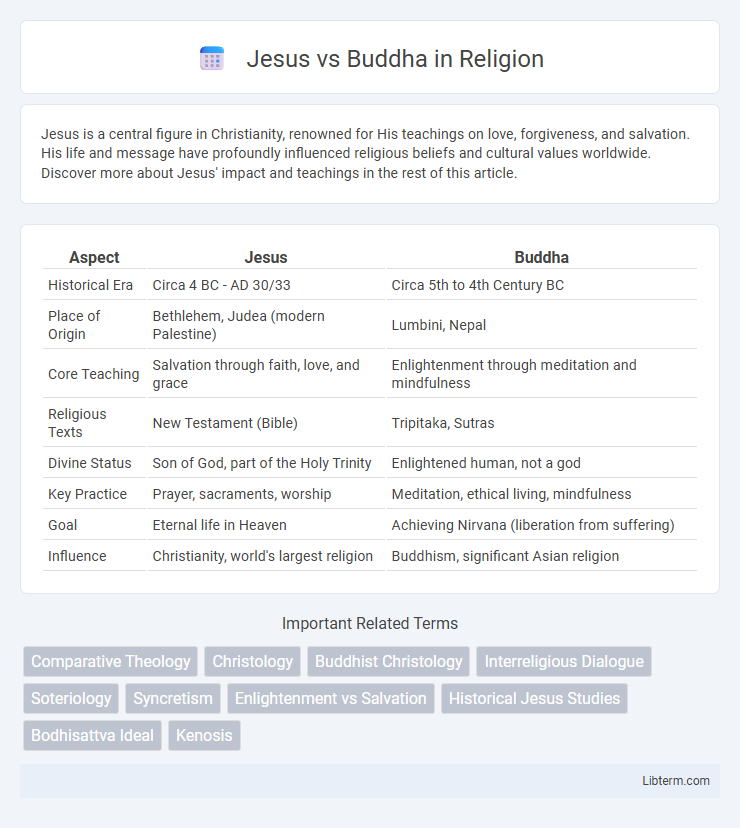Jesus is a central figure in Christianity, renowned for His teachings on love, forgiveness, and salvation. His life and message have profoundly influenced religious beliefs and cultural values worldwide. Discover more about Jesus' impact and teachings in the rest of this article.
Table of Comparison
| Aspect | Jesus | Buddha |
|---|---|---|
| Historical Era | Circa 4 BC - AD 30/33 | Circa 5th to 4th Century BC |
| Place of Origin | Bethlehem, Judea (modern Palestine) | Lumbini, Nepal |
| Core Teaching | Salvation through faith, love, and grace | Enlightenment through meditation and mindfulness |
| Religious Texts | New Testament (Bible) | Tripitaka, Sutras |
| Divine Status | Son of God, part of the Holy Trinity | Enlightened human, not a god |
| Key Practice | Prayer, sacraments, worship | Meditation, ethical living, mindfulness |
| Goal | Eternal life in Heaven | Achieving Nirvana (liberation from suffering) |
| Influence | Christianity, world's largest religion | Buddhism, significant Asian religion |
Introduction: Comparing Jesus and Buddha
Jesus of Nazareth, the central figure of Christianity, taught about salvation through faith, love, and forgiveness, emphasizing a personal relationship with God. Siddhartha Gautama, known as the Buddha, founded Buddhism based on principles of enlightenment, mindfulness, and liberation from suffering through the Eightfold Path. Both spiritual leaders have profoundly influenced global religious thought, yet their teachings diverge in theology, practice, and ultimate goals.
Historical Contexts of Jesus and Buddha
Jesus of Nazareth lived in the 1st century CE during Roman occupation of Judea, a period marked by political unrest and Jewish messianic expectations. Siddhartha Gautama, known as the Buddha, was born in the 5th to 4th century BCE in the Shakya clan of Lumbini, present-day Nepal, amidst a backdrop of early urbanization and religious diversity in ancient India. Both figures emerged as spiritual leaders offering transformative teachings that responded to the social and religious conditions of their respective eras.
Core Teachings and Philosophies
Jesus emphasized love, forgiveness, and salvation through faith in God, advocating for compassion and mercy as the path to eternal life. Buddha taught the Four Noble Truths and the Eightfold Path, focusing on liberation from suffering through mindfulness, ethical conduct, and mental discipline. Both figures promoted ethical living and inner transformation but diverged in their approaches to divinity and the nature of ultimate reality.
Concepts of Salvation and Enlightenment
Jesus teaches salvation through faith in his sacrificial death and resurrection, emphasizing forgiveness of sins and eternal life with God. Buddha's path to enlightenment centers on self-realization, overcoming suffering through the Four Noble Truths and the Eightfold Path, leading to Nirvana. Both figures offer transformative journeys--Jesus through divine grace, Buddha through personal spiritual discipline.
Approaches to Suffering and Compassion
Jesus emphasizes compassionate love through self-sacrifice and forgiveness as a path to alleviating suffering, teaching that enduring hardship with faith leads to spiritual redemption. Buddha advocates understanding the nature of suffering through mindfulness and the Eightfold Path, promoting detachment from desires and cultivating compassion to achieve enlightenment and end suffering. Both figures underscore compassion as essential, but Jesus centers on relational love and salvation, while Buddha focuses on inner wisdom and liberation from attachments.
Practices: Prayer vs. Meditation
Jesus emphasized prayer as a direct communication with God, fostering a personal relationship and seeking divine guidance or intervention. Buddha promoted meditation as a path to mindfulness, self-awareness, and enlightenment by observing thoughts and emotions without attachment. Both practices serve as spiritual tools but differ in approach: prayer centers on connection with a higher power, while meditation focuses on inner consciousness and mental clarity.
Views on Divinity and Humanity
Jesus is regarded in Christianity as both fully divine and fully human, embodying the incarnation of God who lived on Earth to redeem humanity. Buddha, in contrast, is viewed in Buddhism as an enlightened human being who attained Nirvana through spiritual awakening without divine status. These differing perspectives highlight Christianity's emphasis on the divine nature of Jesus versus Buddhism's focus on human enlightenment and self-realization.
Followers and the Spread of Their Teachings
Jesus' teachings have attracted over 2.4 billion Christians worldwide, making Christianity the largest religion globally, with a strong presence across the Americas, Europe, Africa, and parts of Asia. Buddha's teachings have inspired approximately 500 million followers, predominantly in Asia, with significant influence in countries such as China, Japan, Thailand, and Sri Lanka, where Buddhism integrates diverse schools like Theravada, Mahayana, and Vajrayana. The spread of Christianity was accelerated by historical events like the Roman Empire's adoption and European colonization, while Buddhism expanded through trade routes like the Silk Road and missionary work across Asia.
Scriptural Foundations: Bible vs. Sutras
The Bible, composed of the Old and New Testaments, serves as the foundational scripture for Jesus' teachings, emphasizing salvation through faith, the incarnation, and resurrection. In contrast, the Sutras, such as the Pali Canon and Mahayana texts, form the scriptural bedrock for Buddha's teachings, focusing on the Four Noble Truths, the Eightfold Path, and liberation from suffering through enlightenment. These distinct scriptural foundations shape divergent spiritual paths: Christianity's emphasis on divine grace versus Buddhism's practice of self-realization and ethical living.
Influence on Modern Spirituality
Jesus' teachings emphasize love, forgiveness, and salvation, profoundly influencing modern Christian spirituality and ethical frameworks worldwide. Buddha's focus on mindfulness, meditation, and the path to enlightenment shapes contemporary practices in secular spirituality, mental health, and holistic wellness. Both figures contribute foundational principles that continue to inspire diverse spiritual movements and personal growth approaches.
Jesus Infographic

 libterm.com
libterm.com